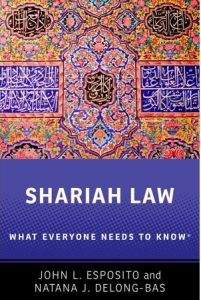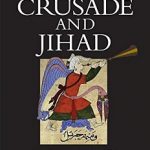By Raymond Ibrahim – Middle East Quarterly (Fall 2018) –
Review of “Shariah Law: What Everyone Needs to Know”. By John L. Esposito and Natana J. Delong-Bas. Oxford: Oxford University Press, 2018.
 The overarching theme of Esposito and Delong-Bas’s book is that the sacred law of Islam is inherently just and equitable, certainly nothing that non-Muslims should fear. The authors explore in eleven chapters many topics associated with Shari’a—which they correctly define as based on the Qur’an and Sunna of Muhammad and thus “immutable and infallible”—including “Shari’a Courts,” “Women, Gender, and the Family,” “Government, Law, and Order,” “Freedom and Human Rights,” and “War, Peace, and the Common Good.”
The overarching theme of Esposito and Delong-Bas’s book is that the sacred law of Islam is inherently just and equitable, certainly nothing that non-Muslims should fear. The authors explore in eleven chapters many topics associated with Shari’a—which they correctly define as based on the Qur’an and Sunna of Muhammad and thus “immutable and infallible”—including “Shari’a Courts,” “Women, Gender, and the Family,” “Government, Law, and Order,” “Freedom and Human Rights,” and “War, Peace, and the Common Good.”
By modern standards, the Qur’an and Sunna are replete with intolerant, violent, supremacist, and misogynistic verses. Therefore, to maintain their thesis, the authors must resort to sophistry, dissembling, obfuscation, and above all, omission.
On topics such as women and non-Muslims, they profusely quote positive or just sounding verses from the Qur’an to prove the benign nature of Shari’a, with little mention of antithetical verses—for example, that the Qur’an permits husbands to beat their wives (Q: 4:34) and have sex slaves (Q: 4:3), or that subject non-Muslims (dhimmis) must always feel humbled (Q: 9:29).
Other times, when there are few positive but many negative Qur’an verses concerning a topic—for instance, that the default relationship between Muslims and non-
Muslims is one of hostility (Q: 60: 4, 5:51, 58:22, 3:28)—the authors shift to citing what Muslims “think” (sometimes via questionable polls), a pursuit that tells next to nothing about their topic, Shari’a.
Finally, resorting to dissembling and omission, the authors insist that jihad is limited to defensive, not offensive, warfare. This remarkable position requires them to omit over a millennium of copiously documented history—during which the bulk of today’s “Islamic world” was violently seized from non-Muslims in massive convulsions of bloodshed and in the name of jihad.
Because the authors know that Shari’a is integral to Islam—revered and adhered to by a majority of Muslims—their book is dedicated to scapegoating others for its shortcomings: fallible Muslim interpretations, self-serving sheikhs and terrorists, patriarchy, suppressive regimes, Western criticism, and encroachments—anything and everything but Shari’a itself.
As such, their book is very much not “what everyone needs to know.”
______________________________
Photo Credit: Georgetown University




